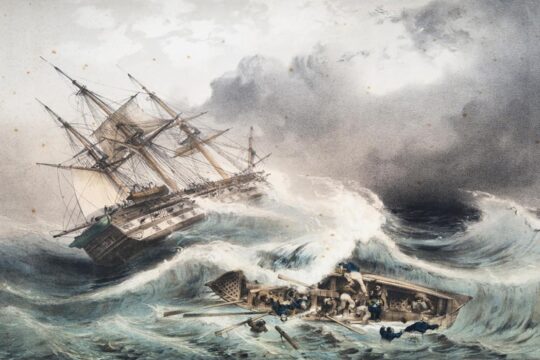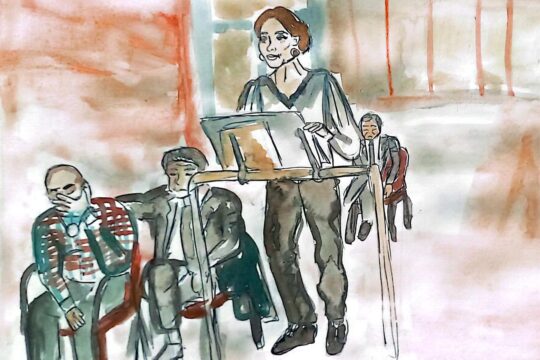Until Sunday, April 21, Polly Higgins' voice was among the strongest for the protection and the defense of the environment. For the past ten years, she had decided to devote her life to what she considered to be a major priority to avoid the massive destruction of ecosystems and life on earth: promoting the crime of ecocide. Last Sunday, the day before Earth Day, she died of an aggressive form of cancer, diagnosed a few weeks ago.
Born in 1968, Polly Higgins studied in Aberdeen, Glasgow and Utrecht before starting a career as a lawyer in London in 1998. After several years practicing criminal, employment and corporate law, she chose to focus her energy and expertise exclusively for the benefit of the planet. In 2010, eight years after the entry into force of the Rome Statute and six years after the opening of the first investigation by the International Criminal Court, Polly Higgins submitted to the United Nations International Law Commission a proposal to amend the Statute to include the crime of ecocide, in addition to the already recognized international crimes of genocide, crimes against humanity, war crimes and crime of aggression.
From the Vietnam War to crimes against indigenous peoples
This was not the first time that the United Nations or its International Law Commission had been seized of this issue. The movement to recognize the crime of ecocide actually dates back to 1970. The biologist Arthur W. Galston, whose research had led to the development of Agent Orange, coined the term to describe and denounce the devastation caused by the use of this defoliant during the Vietnam War. In 1972, at the UN Conference on the Environment in Stockholm, Swedish Prime Minister Olof Palme used it in his opening speech, again with reference to the Vietnam War. And it is once again the massive and deliberate destruction of the environment caused in Vietnam by the American army that was at the heart, in 1973, of a famous article by Richard Falk calling on the UN to adopt a convention defining ecocide as an international war crime.
In 1978, the Special Rapporteur of the United Nations Sub-Commission on Prevention of Discrimination and Protection of Minorities considered in a report the inclusion of this crime within the scope of the 1948 Convention for the Prevention and Punishment of Genocide, without retaining it. The concept of ecocide finally resurfaced in 1985, during discussions in the Sub-Commission on the Promotion and Protection of Human Rights, which had been tasked with reviewing the effectiveness of the 1948 Convention. The sub-commission focused on the dramatic consequences of environmental destruction for indigenous peoples around the world. The concept of ecocide was eventually diluted in those of cultural genocide and ethnocide.
Preventing the worst
Between 1985 and 1996, the United Nations International Law Commission focused more on the definition of environmental crimes in wartime. The issue of environmental crimes in peacetime was only addressed in a separate working group, established in 1995. Sadly, none of its drafts were to be retained. As a result, in 1998, the Rome Statute allowed for the punishment of environmental crimes only as a war crime and in extremely limited cases.
In 2010, Polly Higgins decided to put ecocide back in the spotlight. Her analysis was simple: existing national or international environmental legislations are ineffective. Some individuals hold key positions in companies or governments whose activity or inertia contributes directly or indirectly to the partial or total degradation of ecosystems and to climate change. If these behaviors are not quickly criminalized at the international level, if these individuals remain allowed to continue their destructive activities in all impunity, the result will be massive destruction of the global environment. Living conditions on earth will no longer be tolerable for millions of us, starting with the most vulnerable such as people living on small islands or in countries like Bangladesh who will find themselves caught between rising sea levels and melting glaciers. Millions of lives are at stake. However, it is still possible to prevent the worst, by demanding a rapid reduction in CO2 emissions in the coming years.
The Shell example
It is pursuant to this logic that Polly Higgins announced a few months ago, in parallel with her fight around ecocide and through her organization Ecological Defence Integrity, the opening of an independent investigation into the activities of Shell, one of the main fossil fuel companies. Despite numerous alerts voiced by climatologists over the past decades on the dangers of the company’s activities, the resulting damages and impact on climate change, Shell's managers have not changed their strategy. The current state of scientific knowledge and its conclusions now leave no doubt as to the consequences of such behavior for the planet and for humanity as a whole. Following Polly Higgins' reasoning, if Shell continues to operate without these warnings, its managers could be considered as participants in a joint criminal enterprise, as could any member of government that would directly or indirectly support them, or any other manager of a company in the oil industry.
We must recognize that organizations, governmental or non-governmental, have not succeeded in bringing about the necessary rapid changes. Petitions, marches and lobbying have had little or no effect. School strikes and waves of legal action to hold states and companies accountable for their climate responsibilities have not yet borne fruit. It is now urgent to criminalize the conduct of companies like Shell's. If an amendment were to be proposed, adopted and ratified under the conditions provided for under article 121 of the Rome Statute, and if the jurisdiction of the International Criminal Court were to extend to the crime of ecocide, there is no doubt that many lawyers would immediately use this legal instrument to remind economic or political actors of their environmental and climate responsibility.
Criminal law as a threat to defend the planet
This perspective probably seems very distant, even utopian to most of us. However, ecocide is already recognized in the laws of at least 10 countries (Georgia, Armenia, Ukraine, Belarus, Kazakhstan, Kyrgyzstan, Moldova, Russia, Tajikistan, and Vietnam). In 2011, an ecocide bill was used in a mock trial in the United Kingdom Supreme Court. In 2013, the text of a European directive to incorporate ecocide into European legislation was discussed. Most recently, on 19 March 2019, the French Senate tabled a bill recognizing the crime of ecocide. In France, activists such as Valérie Cabanes, or eminent researchers such as Laurent Neyret, also believe that criminal law should be considered as an instrument in support of the environment. I am convinced that, like me, more and more lawyers and jurists, inspired by Polly Higgins' approach, are now mobilizing all over the world to contribute to the legal edifice that must urgently be built to protect our planet and its ecosystems from us. This planet is the only one we have. That's what Polly Higgins, until her death, urged us to remember.
 MAUD SARLIEVE
MAUD SARLIEVE
Maud Sarliève is a lawyer and teacher at the University of Paris-West-Nanterre. She has worked notably for the office of investigating judges at the Extraordinary Chambers in the Courts of Cambodia, for EULEX in Kosovo and a defence team at the Special Tribunal for Lebanon.







